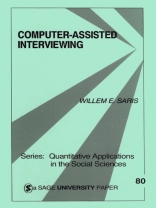This book forms a useful introduction to computer assisted interviewing. . . . The book offers useful practical tips for those previously involved in more traditional questionnaire design, and gives examples of how questions can be adapted for use in computer assisted interviews. . . . Anyone who is already convinced that a computer-assisted interview meets their data gathering needs will find the book a worthwhile addition to the literature on questionnaire design. –International Journal of Nursing Studies ‘A practical and self-contained manual for doing CADAC, written by an author with a lot of experience in this field. It also contains a helpful list of software firms (with addresses) and a good bibliography for further in-depth work on the subject.’ –Bulletin de Methodologie Sociologique ‘This is a useful resource for those wishing to explore CADAC techniques.’ –British Journal of Mathematical and Statistical Psychology Since survey research is a time-consuming and involved process, researchers have found the computer a boon for facilitating the recording and coding of survey responses. As a result, the use of computer-assisted data collection (CADAC) is growing each year. Aimed at aiding researchers in the improvement of their data′s quality, Computer-Assisted Interviewing will help the reader identify the possibilities and difficulties that arise in computer-assisted interviewing. Using concrete examples from surveys, the author annotates samples of actual research questionnaires so that the reader can compare the actual paper questionnaire against the extra statements needed for clear computer-assisted interviewing. In addition, the book includes coverage of the extra possibilities that computer-assisted interviewing has to offer to interviewer-administered interviewing, self-administered interviewing and panel surveys and an overview of the important features to consider if one wants to purchase a CADAC program.
Table of Content
Introduction
Computer-Assisted Interviewing
Different CADAC Applications
Writing Questionnaires
CADAC Hardware and Software
Appendix
Computer Programs
About the author
Willem Saris became full professor in political science, especially the methodology of the social sciences in 1983. He worked at the University of Amsterdam until 2001. In 1984, he created the Sociometric Research Foundation in order to improve social science research by the application of statistics. In 1998, he became member of the methodology group that prepared the start of the European Social Survey (ESS). As a consequence, he was also member of the Central Coordinating Team of the ESS from 2000 to 2012. In 2001, he moved to Barcelona where he received a position as an ICREA professor at ESADE. He was also the director of the Research and Expertise Centre for Survey Methodology (RECSM) at the Universitat Pompeu Fabra from 2009 to 2013. He was one of the founders and the first chairman of the European Survey Research Association (ESRA).For detailed information see https://en.wikipedia.org/wiki/Willem_Saris












